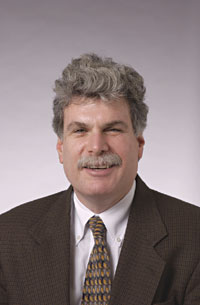Vital Signs
CLINICAL OBSERVATION
In this section, we highlight the human side of clinical academic medicine, putting a few questions to a physician at DMS-DHMC.
Jeffrey Cohen, M.D.
Associate Professor of Medicine (Neurology)
Cohen joined the Dartmouth faculty in 2001. He specializes in neuromuscular diseases, especially polyneuropathy and amyotrophic lateral sclerosis (ALS), and is also interested in electrophysiology, muscle diseases, and the autonomic nervous system, particularly in diabetics. He is associate chief of DHMC's neurology section.
What made you decide to become a physician?
I got a really bad case of the measles as a kid and had to be hospitalized. I wanted to become a doctor so I could understand medical treatments better. And, like most people who grew up in the 1960s, I wanted to help people.
If you weren't a physician, what would you like to be?
I'd like to be an artist (a painter) or a writer. Actually, I've been writing short stories ever since I was a resident.
What famous person, living or dead, would you most like to meet?
When I was a teenager, I wanted to meet the rock musician Jimi Hendrix. As an adult, I wish I could meet the writer Franz Kafka.
What kind of books do you read most often?
I like short stories by Franz Kafka, Isaac Bashevis Singer, Ernest Hemingway, John Cheever, and Russian writers. The last books I read were John Updike's Seek My Face and Isaac Bashevis Singer's latest short-story collection.

|
Jeffrey Cohen, M.D. |
What are the greatest frustration and the greatest joy in your work?
It's frustrating that there are very few effective treatments for neurological diseases. Our patients require a lot of time and attention, and there never seems to be enough time to meet all their psychological and physiological needs. My greatest joy is realizing I made a difference in the lives of some of my patients by making a diagnosis—especially an obscure diagnosis—that helped them. For example, I once diagnosed a patient with Miller Fisher syndrome, a variant of Guillain- Barre syndrome. We were able to treat the patient with intravenous immunoglobulin.
Of what professional accomplishment are you most proud?
Here at DHMC, I helped to set up a multidisciplinary ALS clinic a few years ago. It has really improved the care of patients.
Who was your medical mentor?
The late Morris Bender, a world-renowned neurologist who was an emeritus professor at Mt. Sinai Medical Center when I did my residency there. He taught me to be a keen observer of patients and to accept clinical observations that do not conform to our usual beliefs.
Is there anything that family and colleagues give you a hard time about?
Sometimes they think I'm too silly. I like to play practical jokes on people in the department.
What's your favorite nonwork activity?
I love taking walks and thinking. I often walk on part of the Appalachian Trail near my home.
What kind of music is in your CD-player right now?
The Scandinavian rock group Kosheen, Cream, Eminem, and Miles Davis. I listen to anything, ranging from rock to jazz to rap to classical.
What advice would you offer to someone brand new in your field or to someone contemplating entering it?
I would tell someone to be able to accept uncertainty. Neurology is pretty elusive. It's not black and white like cardiology.
Fill in the blank: "I'd rather be . . ."
Guitarist Eric Clapton for a week.
